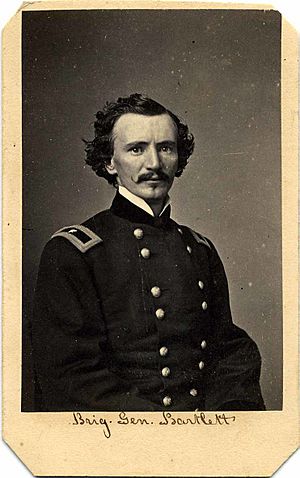Joseph J. Bartlett facts for kids
Quick facts for kids
Joseph Jackson Bartlett
|
|
|---|---|
 |
|
| Born | November 21, 1834 Binghamton, New York |
| Died | January 14, 1893 (aged 58) Baltimore, Maryland |
| Place of burial | |
| Allegiance | United States of America Union |
| Service/ |
United States Army Union Army |
| Years of service | 1861–1866 |
| Rank | |
| Commands held | 27th New York Volunteer Infantry Regiment |
| Battles/wars | American Civil War |
| Other work | Ambassador to Sweden and Norway |
Joseph Jackson Bartlett (born November 21, 1834 – died January 14, 1893) was an important figure in American history. He was a lawyer from New York, a high-ranking officer called a brigadier general in the Union Army during the American Civil War, and later a diplomat for the United States.
One of his most notable moments was at Appomattox Court House. Here, he was chosen to officially accept the surrender of weapons from General Robert E. Lee's Army of Northern Virginia. This event marked the end of the Civil War.
Contents
Early Life and Law Career
Joseph Bartlett was born in Binghamton, New York. His father, Joseph Bartlett, was a gunmaker. Young Joseph went to a local school and then studied law in Utica.
In 1858, he passed his law exam and started his own law practice in Binghamton. Later, he moved his practice to Elmira. This was just before the Civil War began in 1861.
Joining the Civil War
When the Civil War started, Bartlett quickly joined the army. On May 21, 1861, he enlisted in the 27th New York Infantry regiment in Elmira. He was first elected as a captain of a company, which is a small group of soldiers.
Soon after, he was promoted to major. He served under the regiment's first colonel, Henry Warner Slocum.
First Battle of Bull Run
After only a few weeks of training, Bartlett and his regiment faced their first major battle. This was the First Battle of Bull Run in Virginia. During the battle, Colonel Slocum was wounded. Bartlett bravely took command of the 27th New York for the rest of the fight.
He acted aggressively to protect the soldiers as they retreated. Because of his courage, he was promoted to colonel on September 21. He replaced Slocum, who became a brigadier general.
Leading in Major Campaigns
In 1862, Bartlett led his regiment through several important campaigns. His unit was part of the Army of the Potomac's VI Corps. He fought in the Peninsular Campaign and the Maryland Campaign.
During the Battle of South Mountain, he led a strong attack up a steep mountain towards Crampton's Gap. On October 4, 1862, Bartlett was promoted to brigadier general. He was then given command of an infantry brigade within the VI Corps.
Key Battles and Promotions
Bartlett's next big fight was in May 1863 at the Battle of Salem Church. His brigade lost more than a third of its 1,500 men, but he managed to keep his troops organized. His men were mostly held in reserve during the famous Battle of Gettysburg.
Later that year, Bartlett moved to the V Corps for the Mine Run Campaign. He even led the first division of this corps for a short time. In 1864, he was very active in the Overland Campaign and the Siege of Petersburg.
During the last year of the war, he led a division in the Appomattox Campaign. After General Philip Sheridan removed Major General Gouverneur K. Warren from command, Bartlett took over the division. After the war, he received an honorary promotion to major general. He also briefly commanded a division of the IX Corps.
Life After the War
After the Civil War, Joseph Bartlett stayed in the army for a short time. He helped with the occupation duties in the South during the early days of Reconstruction. He officially left the army on January 15, 1866.
He then went back to his law practice in New York. In 1867, President Andrew Johnson appointed him as the United States Ambassador to Sweden and Norway. He served as an ambassador for two years, returning home in 1869.
Bartlett continued his law career. From March 1885 to July 1889, he took a break from law. During this time, he served as Deputy Commissioner of Pensions under President Grover Cleveland. Throughout his life, he suffered from rheumatism, which was caused by being exposed to harsh conditions during the war.
Joseph Bartlett passed away in Baltimore, Maryland, in 1893. He is buried in Arlington National Cemetery in Arlington, Virginia. A local veterans' group in Binghamton, New York, was named in his honor.

